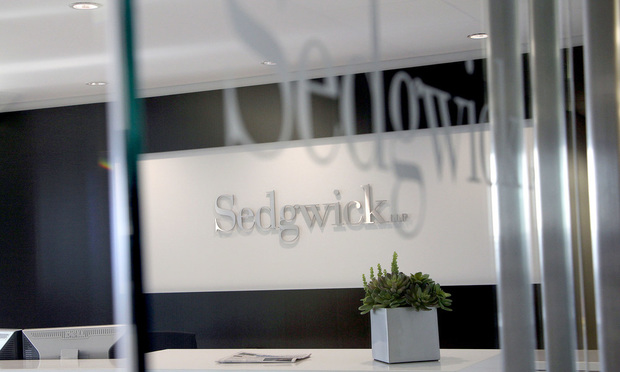Clydes and DACB eye up Sedgwick London office ahead of US firm's dissolution
Suitors emerge for US firm's 13-lawyer City base ahead of January closure
November 23, 2017 at 07:51 AM
5 minute read
Clyde & Co and DAC Beachcroft are in the running to take on Sedgwick's London office, after the US firm announced that it will close for business early next year.
The London office, which houses 13 lawyers, including six partners, operates as a separate limited liability partnership to the US arm of the firm. It is is led by insurance partner Edward Smerdon, who is also an at-large member of Sedgwick's executive committee.
Multiple sources with knowledge of the matter said that interest in taking on the London team had been registered by both Clydes and DAC Beachcroft, and that Clydes had held talks at least three weeks ago.
Clydes is also understood to be in talks to take on teams of Sedgwick lawyers in the US, where the San Francisco-based firm has offices in Chicago, Dallas, Kansas, Los Angeles, Miami, New Jersey, New York, Seattle and Orange County.
In a statement, Clydes said: "As with all major businesses, we continuously study our markets for opportunities and, at any given time, we may be in discussion with a number of individuals, teams or firms. As a matter of policy we never comment on such discussions until it is appropriate to do so." DAC Beachcroft declined to comment.
News of Clydes and DACB's interest in Sedgwick's London team comes after the firm's announcement that it would wind down its business ahead of a closure in early January. The decision follows a stream of partner departures and office closures in Washington DC, Austin, Fort Lauderdale and Houston.
The firm's headcount has been slashed by 39% over twelve months, leaving it with fewer than 160 lawyers, according to data complied by ALM Legal Intelligence. Six partners from the firm's New York and Chicago have recently joined Kennedys, including New York and Chicago managing partners John Blancett and Eric Scheiner.
Sedgwick's dissolution could be the start of a long and costly ordeal for its former partners and, potentially, the law firms where they resume their careers, according to Legal Week sister title The American Lawyer.
Any mass hire of Sedgwick lawyers could be carried out in a similar manner to Blank Rome's February 2016 addition of 100 lawyers from Dickstein Shapiro, according to industry sources.
In that deal, Blank Rome avoided assuming the failing firm's debts, while absorbing the accounts receivable of some of Dickstein Shapiro's top billers. That deal has so far avoided being publicly contested by former Dickstein Shapiro partners who may still use the courts to regain lost capital, according to one legal industry source familiar with the deal.
While any mass hire of Sedgwick lawyers is likely to be smaller than the size of Blank Rome's mass acquisition, one potential complication for the firm is the number of rainmakers who have already left the firm in the past year who are owed capital. Adding to that complication is a capital contribution policy at the firm that required more money from the highest-paid partners, as described to The American Lawyer by a source familiar with Sedgwick's finances.
Sedgwick required equity partners to contribute capital equal to 50%-55% of their highest annual compensation. New partners were given two years to pay their total capital requirement, and partners who earned a boost in compensation in any year were required to up their capital account in the same year, the source said. For departing partners, the firm paid out capital contributions over 36 months.
It is unclear if Sedgwick has been making those payments. But either way, the firm's obligation has been rapidly growing. The firm has seen around 50 partners leave the firm over the last 12 months, although it is unlikely that all were equity partners.
One purported benefit for a law firm of requiring a large capital account is that it can encourage partners to stay at the firm and also to fight to save it during a downturn. But there is also a significant downside.
"A lot of people are going to lose a lot of money," said one legal industry source.
If Sedgwick is unable to avoid a formal bankruptcy filing, departed partners who have received capital payments or salary in the past 18 months could be the target of a bankruptcy trustee.
In the case of now-defunct Dewey & LeBoeuf, a group of dozens of partners eventually agreed to pay a total of $71m in capital and salary to settle claims with a bankruptcy trustee. Some partners opted out of that settlement, and at least three former partners eventually filed for bankruptcy as a result of debts incurred by the firm's demise.
One former equity partner at Sedgwick who left the firm earlier this year described his time at Sedgwick as "expensive."
"I'm just trying to put that whole experience out of my mind," the former partner said.
DAC Beachcroft declined to comment.
This content has been archived. It is available through our partners, LexisNexis® and Bloomberg Law.
To view this content, please continue to their sites.
Not a Lexis Subscriber?
Subscribe Now
Not a Bloomberg Law Subscriber?
Subscribe Now
NOT FOR REPRINT
© 2025 ALM Global, LLC, All Rights Reserved. Request academic re-use from www.copyright.com. All other uses, submit a request to [email protected]. For more information visit Asset & Logo Licensing.
You Might Like
View All
Hengeler Advises On €7B Baltica 2 Wind Farm Deal Between Ørsted and PGE
2 minute read


Fidal Launches Disputes Practice; Pinsent’s Paris Arbitration Partner Jumps to Boutique Firm, Plus Other French Moves
5 minute readTrending Stories
Who Got The Work
J. Brugh Lower of Gibbons has entered an appearance for industrial equipment supplier Devco Corporation in a pending trademark infringement lawsuit. The suit, accusing the defendant of selling knock-off Graco products, was filed Dec. 18 in New Jersey District Court by Rivkin Radler on behalf of Graco Inc. and Graco Minnesota. The case, assigned to U.S. District Judge Zahid N. Quraishi, is 3:24-cv-11294, Graco Inc. et al v. Devco Corporation.
Who Got The Work
Rebecca Maller-Stein and Kent A. Yalowitz of Arnold & Porter Kaye Scholer have entered their appearances for Hanaco Venture Capital and its executives, Lior Prosor and David Frankel, in a pending securities lawsuit. The action, filed on Dec. 24 in New York Southern District Court by Zell, Aron & Co. on behalf of Goldeneye Advisors, accuses the defendants of negligently and fraudulently managing the plaintiff's $1 million investment. The case, assigned to U.S. District Judge Vernon S. Broderick, is 1:24-cv-09918, Goldeneye Advisors, LLC v. Hanaco Venture Capital, Ltd. et al.
Who Got The Work
Attorneys from A&O Shearman has stepped in as defense counsel for Toronto-Dominion Bank and other defendants in a pending securities class action. The suit, filed Dec. 11 in New York Southern District Court by Bleichmar Fonti & Auld, accuses the defendants of concealing the bank's 'pervasive' deficiencies in regards to its compliance with the Bank Secrecy Act and the quality of its anti-money laundering controls. The case, assigned to U.S. District Judge Arun Subramanian, is 1:24-cv-09445, Gonzalez v. The Toronto-Dominion Bank et al.
Who Got The Work
Crown Castle International, a Pennsylvania company providing shared communications infrastructure, has turned to Luke D. Wolf of Gordon Rees Scully Mansukhani to fend off a pending breach-of-contract lawsuit. The court action, filed Nov. 25 in Michigan Eastern District Court by Hooper Hathaway PC on behalf of The Town Residences LLC, accuses Crown Castle of failing to transfer approximately $30,000 in utility payments from T-Mobile in breach of a roof-top lease and assignment agreement. The case, assigned to U.S. District Judge Susan K. Declercq, is 2:24-cv-13131, The Town Residences LLC v. T-Mobile US, Inc. et al.
Who Got The Work
Wilfred P. Coronato and Daniel M. Schwartz of McCarter & English have stepped in as defense counsel to Electrolux Home Products Inc. in a pending product liability lawsuit. The court action, filed Nov. 26 in New York Eastern District Court by Poulos Lopiccolo PC and Nagel Rice LLP on behalf of David Stern, alleges that the defendant's refrigerators’ drawers and shelving repeatedly break and fall apart within months after purchase. The case, assigned to U.S. District Judge Joan M. Azrack, is 2:24-cv-08204, Stern v. Electrolux Home Products, Inc.
Featured Firms
Law Offices of Gary Martin Hays & Associates, P.C.
(470) 294-1674
Law Offices of Mark E. Salomone
(857) 444-6468
Smith & Hassler
(713) 739-1250









